Scuba diving is one of the most unfiltered, exciting and rewarding ways to experience our blue planet. Indeed, we believe in the great and equalizing power of the ocean to help, heal, challenge and change people. While women represent a little less than 40% of all divers worldwide, there’s still a notable gender gap when it comes to professional diving: women currently represent only 20% of all PADI Pros. That’s lower than in medicine (34%), the legal profession (38%) and financial services (less than 33%).
We’ll explore potential reasons behind this gap and ways to address it. Furthermore, we’ll talk with some of the female PADI Pros leading that shift.
Francesca Trotman is a marine biologist and the Managing Director and Founder of conservation non-profit Love The Oceans. A PADI Divemaster, she credits her training with undeniably transforming her life in ways she never could have anticipated. Working in Jangamo Bay, Mozambique, Trotman and her team support and empower the local community to protect their waters. Critically, they know that basic needs must be met before people can get in the water or begin diving.
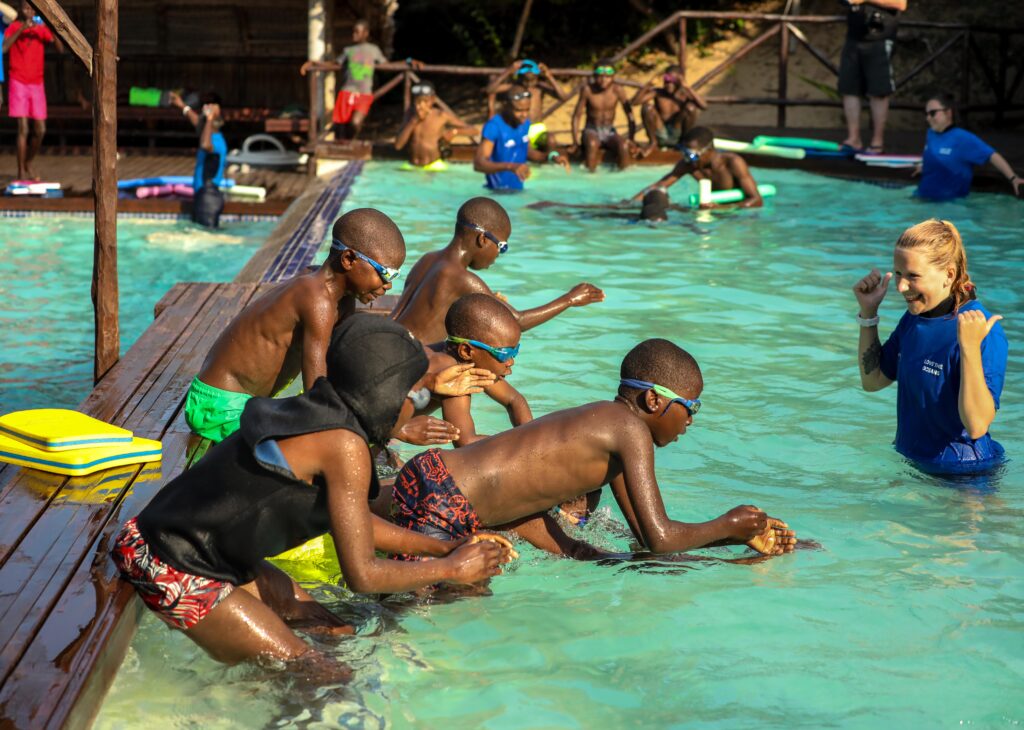 Young swimmers gain skills, confidence and a passion for the water through Love The Ocean’s Free Swim program. Stella Levantesi/Photographers Without Borders
Young swimmers gain skills, confidence and a passion for the water through Love The Ocean’s Free Swim program. Stella Levantesi/Photographers Without Borders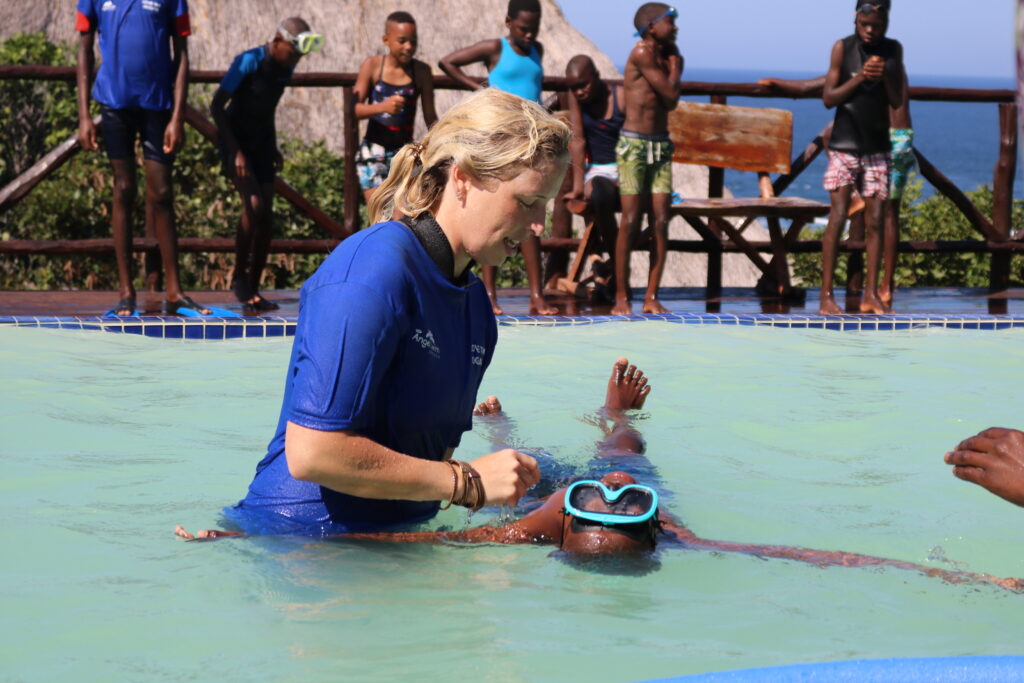 Swim Instructors wtih Love The Ocean help young locals learn to swim. Dean Kay-Barry
Swim Instructors wtih Love The Ocean help young locals learn to swim. Dean Kay-Barry“To close the gender gap … in the diving industry, it’s imperative we prioritize equity over mere equality,” Trotman said. “This involves providing women with the necessary resources to access the same skill-building opportunities as their male counterparts, addressing both prominent barriers and subtle hindrances.”
Love The Oceans tackles the gender gap in Mozambique in several, crucial ways. First, appropriate menstrual management has traditionally limited opportunities for girls and women to participate in swimming and diving, Trotman said. Her “Gender Equity” project will provide access to menstrual products to get more women in the water.
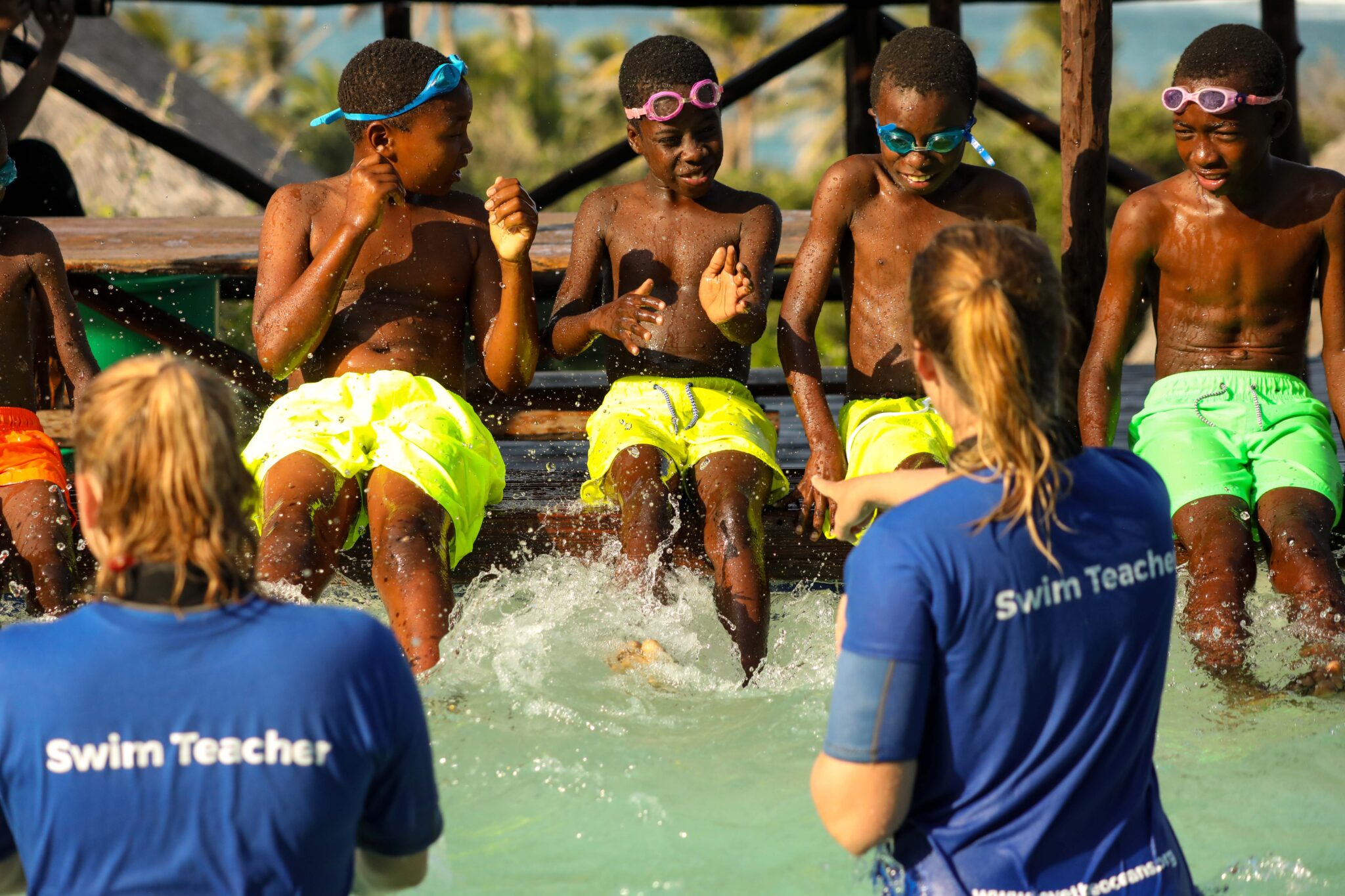 Love the Oceans works to help locals gain basic water proficiency and comfort, removing their first barriers to participation in ocean conservation. Stella Levantesi/Photographers Without Borders
Love the Oceans works to help locals gain basic water proficiency and comfort, removing their first barriers to participation in ocean conservation. Stella Levantesi/Photographers Without Borders
Secondly, the team’s “Free Swimming” initiative empowers local boys and girls with swimming skills, role models and safe spaces to learn to swim. A “staggering” 95% of individuals in their area don’t know how to swim – a foundational skill for diving, explained Trotman. The gap in swimming proficiency becomes “particularly pronounced among girls” due to the cultural prioritization of boys.
Therefore, Trotman’s team has trained the first female swimming instructors in their area. These individuals serve as role models for girls and encourage girls to take up swimming, she added. Moreover, “Thanks to the support of PADI, these trailblazing women will soon become the first female Mozambican scuba divers in our district. This remarkable achievement not only shatters historic gender barriers but also serves as an inspiration for future generations,” Trotman said.
Swimming, Scuba and other FAQs
Marine biologist, PADI Instructor and Founder of Women in Ocean Science Madeline St Clair feels grateful she grew up diving and engaging in conservation in the UK. Now, having spent most of her career in the Indo-Pacific, she wants to create those same opportunities for other women.
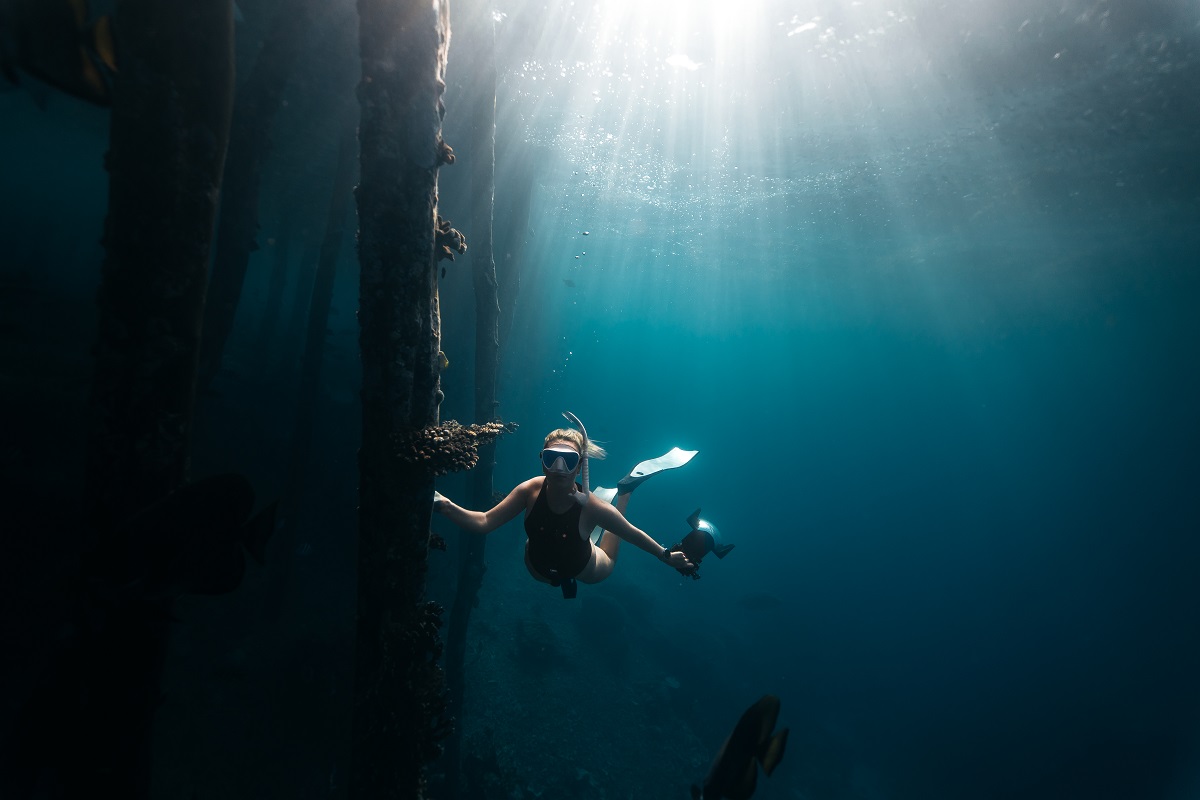 Madeline St Clair is “paying forward” the opportunities she had growing up in the UK to dive and engage in conservation by creating those for others. Courtesy Madeline St Clair
Madeline St Clair is “paying forward” the opportunities she had growing up in the UK to dive and engage in conservation by creating those for others. Courtesy Madeline St Clair
“Women don’t need to be empowered; they’re already so powerful but need the opportunity to access their power from within.”
St Clair summarized Zainab Salbi’s words, offering them as a core belief behind her work in the Indo-Pacific region. A few years ago, Women in Ocean Science developed “Empower Ocean,” a female empowerment and capacity-building program. Through this, St Clair works daily to help more local women access these wonders. She’s currently piloting the project in Raja Ampat, home to the most biodiverse coral reefs in the world.
“We’re facilitating opportunities for Papuan women to be actively involved as guardians of their own marine environment in collaboration with local stakeholders,” she said. “We do this through researching gender barriers, conducting dive training and reef monitoring programmes with local women….” Through this, they increase the visibility of female role models within their community – empowering these women to take a proper seat at the table for future conversations surrounding the reef’s management and conservation, she added.
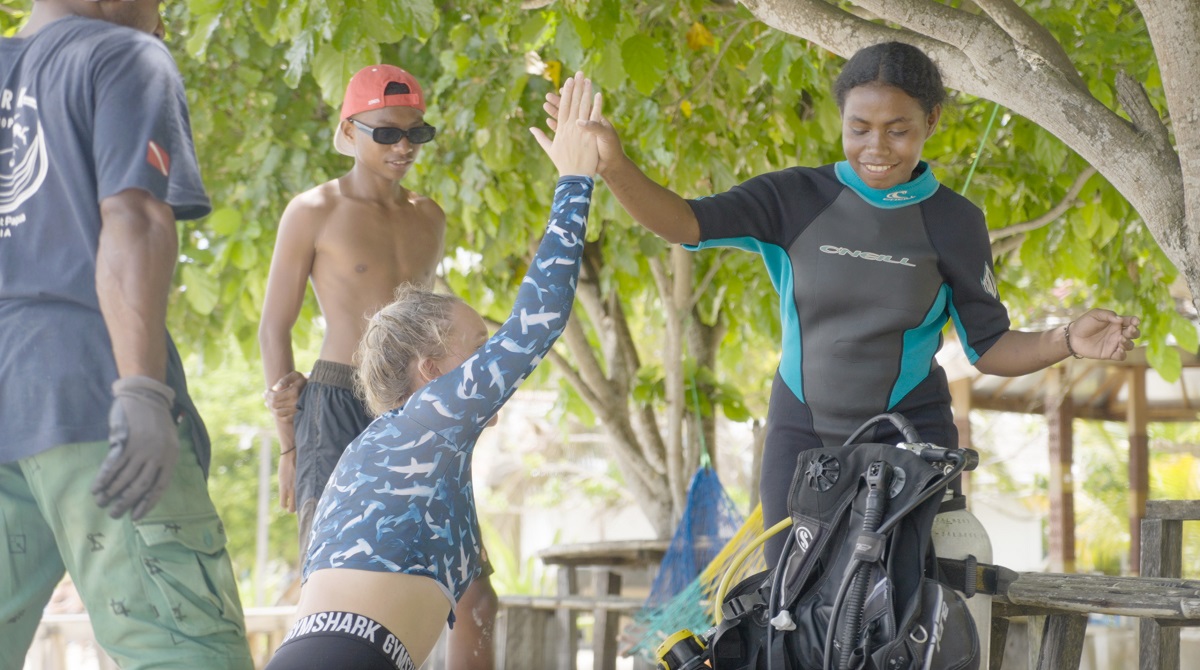 Through “Empower Ocean,” Madeline St Clair teaches local women to become guardians of their home waters. Courtesy Madeline St Clair
Through “Empower Ocean,” Madeline St Clair teaches local women to become guardians of their home waters. Courtesy Madeline St Clair
She recalled training the first woman from the local community. St Clair said, “She was a brilliant diver straight off the bat…. She’d spent 19 years swimming and snorkeling in the water around her home. And, seeing her dive – excited, curious – that was a really beautiful moment. It was very emotional. I cried a lot underwater that day.”
This woman is now an incredible champion for her ocean and serves as a role model for young girls around her. “Representation really matters, and I have no doubt that she will absolutely be a catalyst for change for women divers within the region,” St Clair added. “It’s very moving, because the passion, curiosity and desire to learn were there all along, really. Women already come with wings. Now, we just have to make sure everybody gets the opportunity to fly.”
More PADI women saving the ocean
Growing up in Male, Maldives, Shaha Hashim recalls overcoming several barriers to become a PADI Divemaster as well as the Chairperson and Maldives Resilient Reefs/Maldives Programme Manager at the Blue Marine Foundation.
She said, “Traditionally, men were expected to be fishers and seafarers and had more freedom to interact with the ocean, so they had a better understanding of the sea. Even though this is now changing, very few women in our generation have had the opportunity to experience [the ocean’s] beauty.”
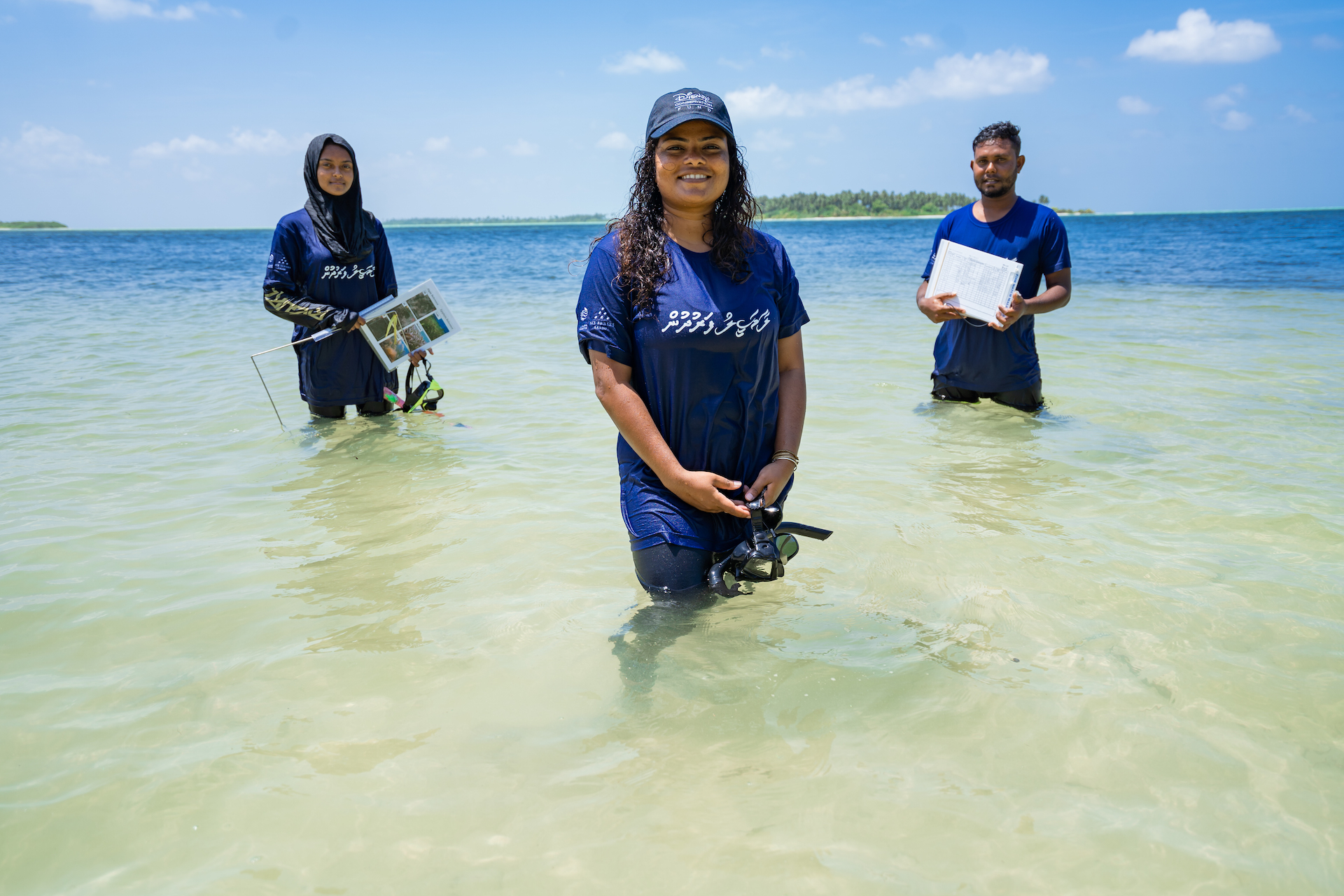 Shaha Hashim guides citizen scientists in doing ocean surveys. Courtesy Shaha Hashim
Shaha Hashim guides citizen scientists in doing ocean surveys. Courtesy Shaha Hashim
Indeed, Hashim’s dad didn’t approve of diving, so she waited until she could pay for her own PADI Open Water Diver certification and did so without him knowing. He eventually came to accept it, but not all are as lucky, she noted. She also knows how lucky she was to have a dive center catering to locals in Male because access to dive facilities is another barrier in the country.
“Diving truly liberates me,” she said. “I am extremely grateful to have the chance to observe and study our backyard reefs and to share my experiences with others.”
Hashim acknowledged the people working to break down traditional barriers between locals and the ocean in the Maldives through swimming, snorkeling and diving programs. As a PADI Divemaster, she also guides people underwater and leads coral reef survey teams in her home waters.
Additionally, with PADI’s support, she conducts citizen science programs to teach young people in the atoll to conduct ecosystem monitoring. So far, she’s trained 15 people from the community to become PADI Open Water Divers further trained in scientific monitoring of coral reefs.
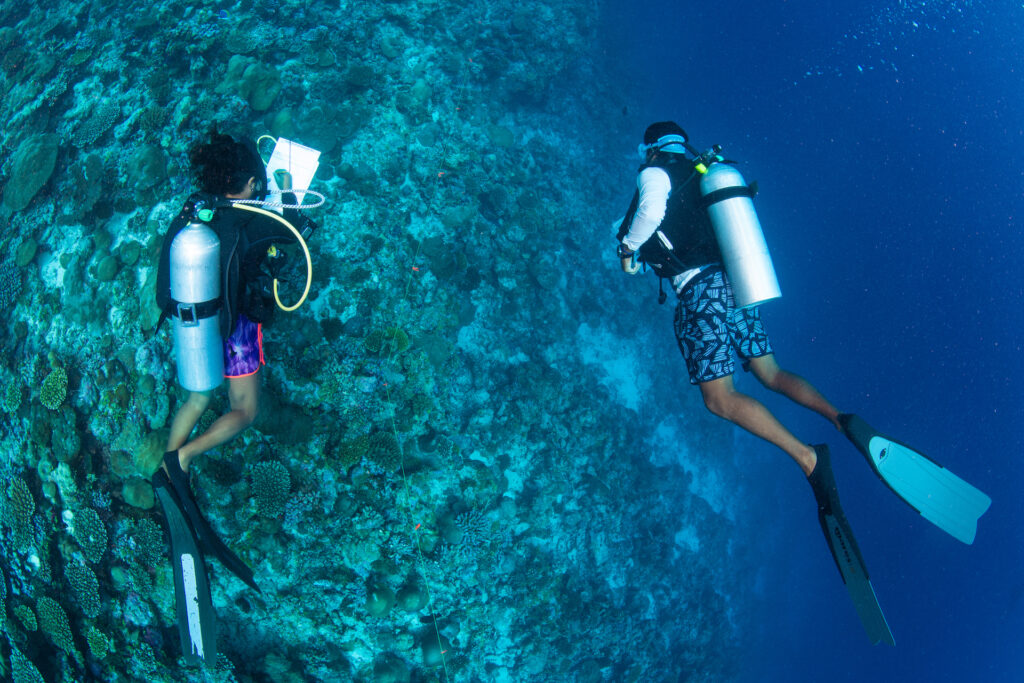 Shaha Hashim loves exploring the underwater world and working as a PADI Pro to help others witness its beauty. Alex Mustard
Shaha Hashim loves exploring the underwater world and working as a PADI Pro to help others witness its beauty. Alex Mustard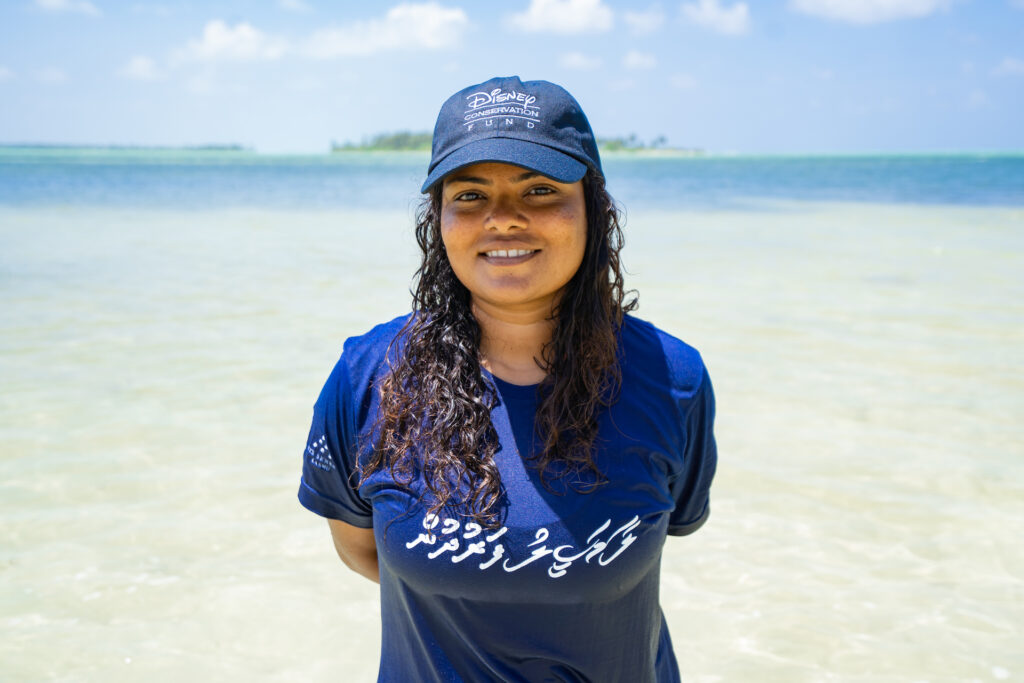 Shaha Hashim broke social barriers in learning to dive. Her love of the ocean spurs her to help others experience its beauty also. Courtesy Shaha Hashim
Shaha Hashim broke social barriers in learning to dive. Her love of the ocean spurs her to help others experience its beauty also. Courtesy Shaha Hashim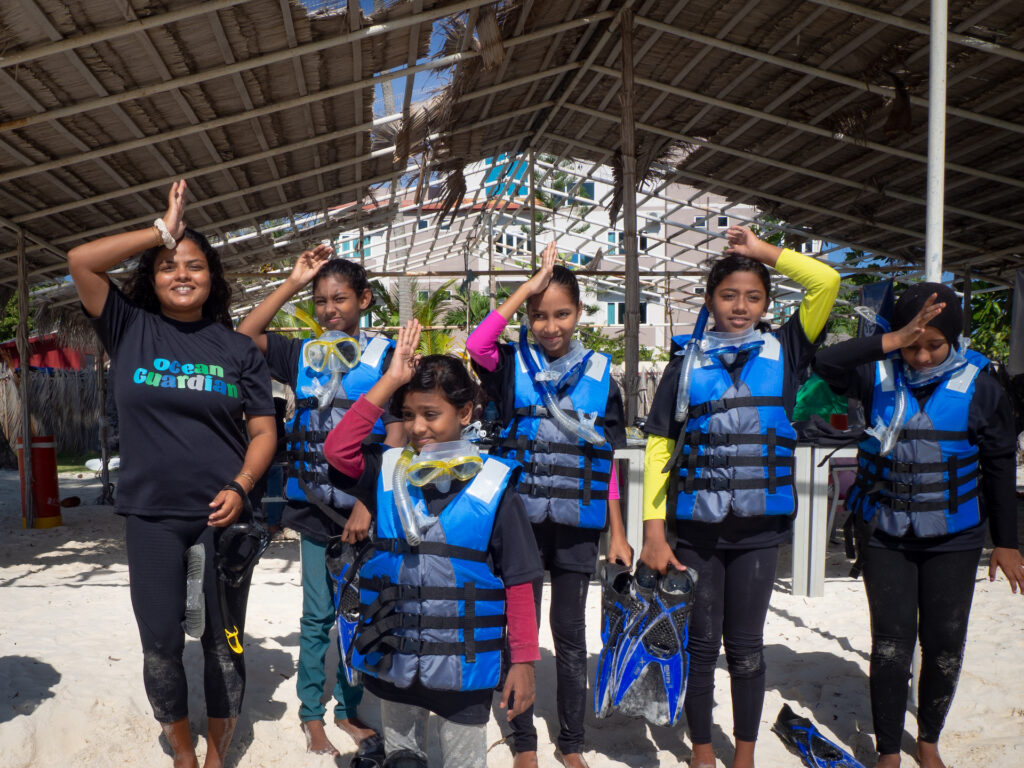 Shaha Hashim conducts a shark snorkeling program in her native Maldives. Courtesy Shaha Hashim
Shaha Hashim conducts a shark snorkeling program in her native Maldives. Courtesy Shaha Hashim“I have seen how people’s perceptions change when they understand the fragility and interconnectedness of the coral reef, rather than just viewing it as a place to extract from,” she said. “Some of our citizen scientists have become ocean advocates in their communities, and others have found opportunities to pursue diving and conservation careers.”
Finally, she also believes that the tourism industry, which is largely dependent upon the Maldives’ marine resources and makes a huge profit from these, needs to do more. They should create access and ocean experience activities for local students and their parents. She also advocates for guidance and mentoring for young people wanting a career in diving.
Scuba Breaks Down Social Barriers
Callie Veelenturf is a marine biologist, PADI Divemaster, National Geographic Explorer and the Executive Director of The Leatherback Project. In addition to advocating for high-impact conservation proposals worldwide and advancing legislation for the Rights of Nature, she focuses on protecting the Pearl Islands, Panama. She believes this area serves as sea turtle nesting and foraging grounds, so works with locals to better understand and protect the archipelago.
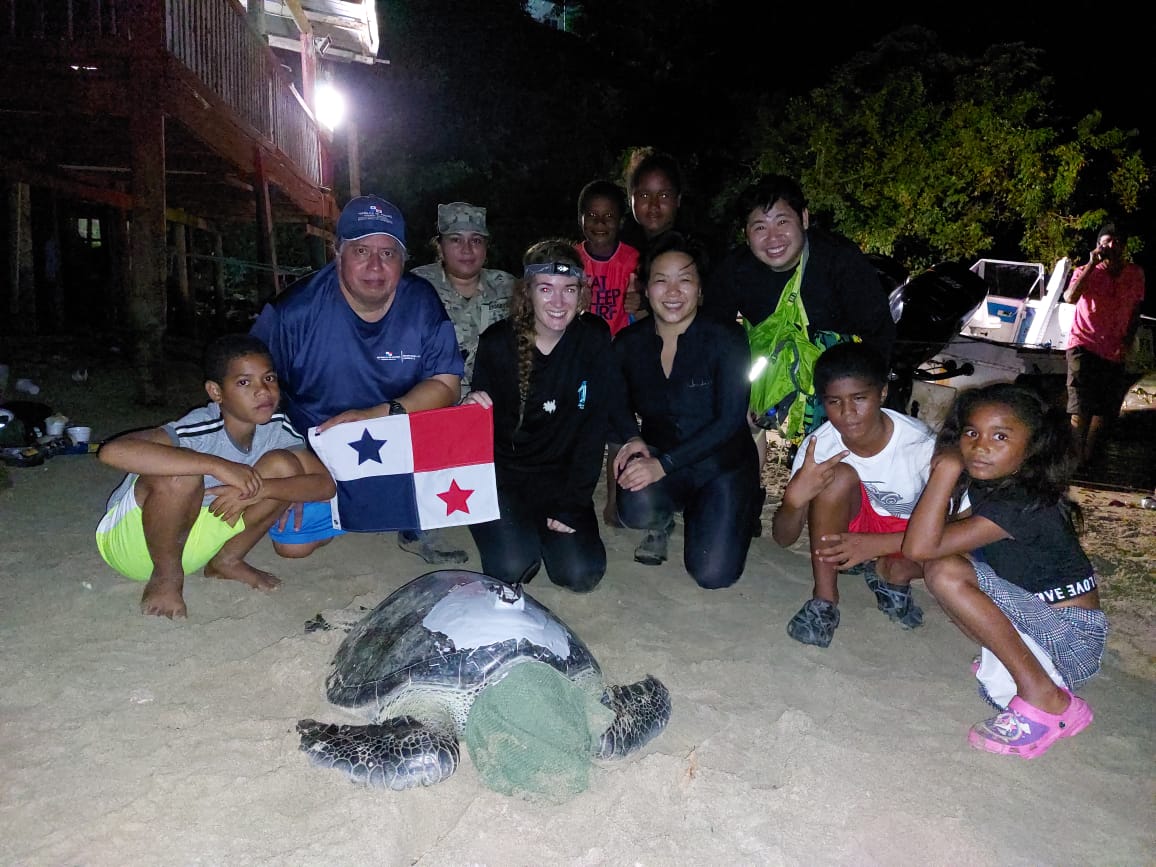
Callie Veelenturf works with locals in Panama to study and tag endangered sea turtles. Here, local children on Saboga Island gather to learn from her and her team. Tiffany Duong/Ocean Rebels
“Bringing young women into the diving community early on is a great way to close the gender gap,” Veelenturf said. “Having female divers speak in schools and lead afterschool programs can help young women understand from an early age that they have a place in this field!”
Veelenturf is putting her fins in the water and doing just this in Saboga, a village in the Pearl Islands. There, The Leatherback Project facilitates snorkeling opportunities for local children and adults. Furthermore, the organization even gifted a few their first masks, snorkels and fins. One adult recipient, Aida Magaña, is running to be the representative for her local area in the next elections. She’s also the Pearl Islands Hope Spot Champion through Sylvia Earle’s Mission Blue.
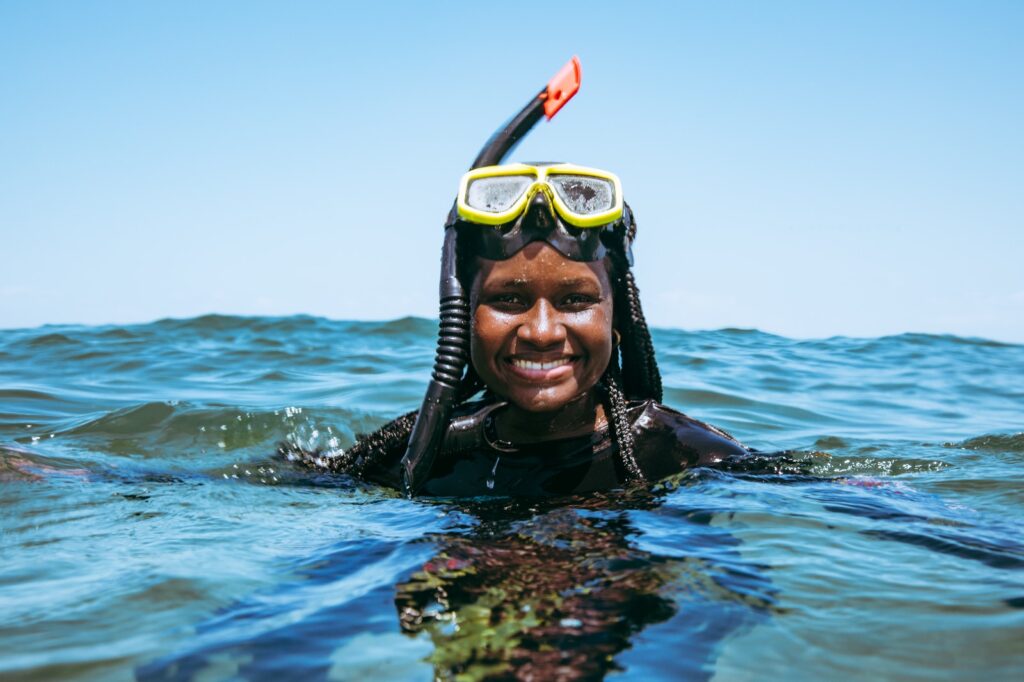 The Leatherback Project gifted Aida Magaña her first mask, snorkel and fins. Magaña is running for local representative and is the Hope Spot Champion for the Pearl Islands in Panama. The Leatherback Project
The Leatherback Project gifted Aida Magaña her first mask, snorkel and fins. Magaña is running for local representative and is the Hope Spot Champion for the Pearl Islands in Panama. The Leatherback Project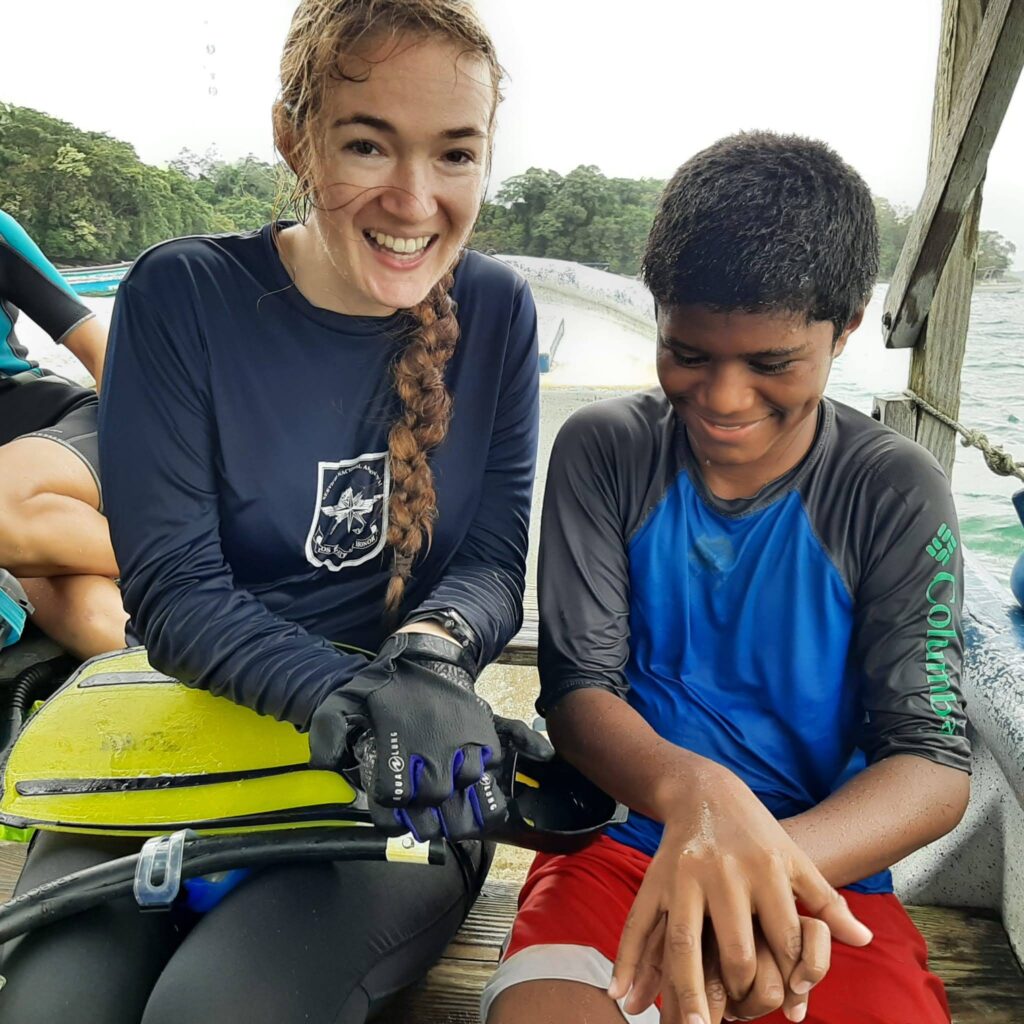 Callie Veelenturf teaches local Ibdiel Gutierrez how to make the dive sign for sea turtle after he spots his first ever in the wild on his first snorkel. Tiffany Duong/Ocean Rebels
Callie Veelenturf teaches local Ibdiel Gutierrez how to make the dive sign for sea turtle after he spots his first ever in the wild on his first snorkel. Tiffany Duong/Ocean Rebels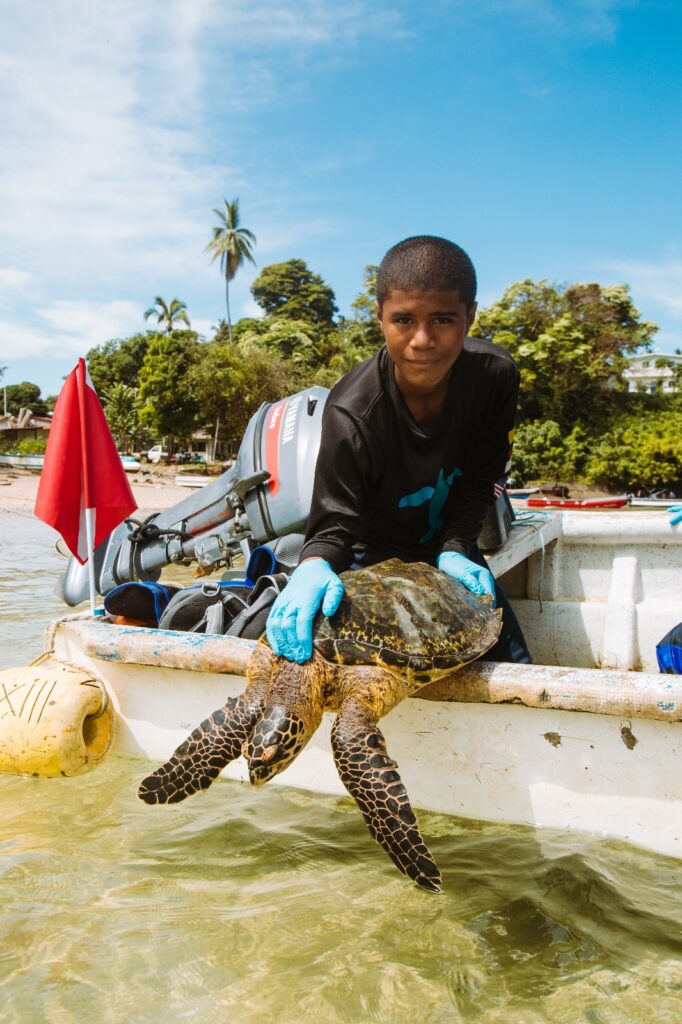 Ibdiel Guitierrez showed immediate interest in the ocean and sea turtles when Callie Veelenturf first met him. Two years later, he’s snorkeling and helping with her surveys, hoping to become a marine biologist himself. The Leatherback Project
Ibdiel Guitierrez showed immediate interest in the ocean and sea turtles when Callie Veelenturf first met him. Two years later, he’s snorkeling and helping with her surveys, hoping to become a marine biologist himself. The Leatherback ProjectBeyond getting acquainted with the water, Veelenturf also inspires others to conserve the oceans. Indigenous biologist Ramiselia Ramirez never worked with sea turtles previously and now is trained to help Veelenturf. Additionally, the biologist met local Sabogan siblings Ibdiel and Zulema Gutiérrez when they were 10 and 8, respectively. The biologist has since gifted each their own snorkeling gear, and they survey alongside her team every chance they can.
“It feels so inspiring and hope-instilling to introduce people to conservation work,” Veelenturf said. “It makes me feel like there is hope for the future of the planet. These young people care so much about the turtles and marine ecosystems existing beside their communities.”
How to Inspire the Next Generation of Dive Women
Claudia Schmitt is a PADI Divemaster and underwater filmmaker with The Jetlagged. “Diving changes your perspective,” she said. “You enter another world that many people don’t have access to.” Now, she recreates and reimages these worlds for all to enjoy.
Schmitt uses her art as a filmmaker to draw people in and to inspire them to explore and dive for themselves, she said.
As she became more involved with conservation filmmaking, she also realized her images could support that important work. Moreover, Schmitt added, “Every day we are inspired by all the people, often divers, who are doing everything they can to protect the ocean. I believe that as divers, we can all be ambassadors for the underwater world!”
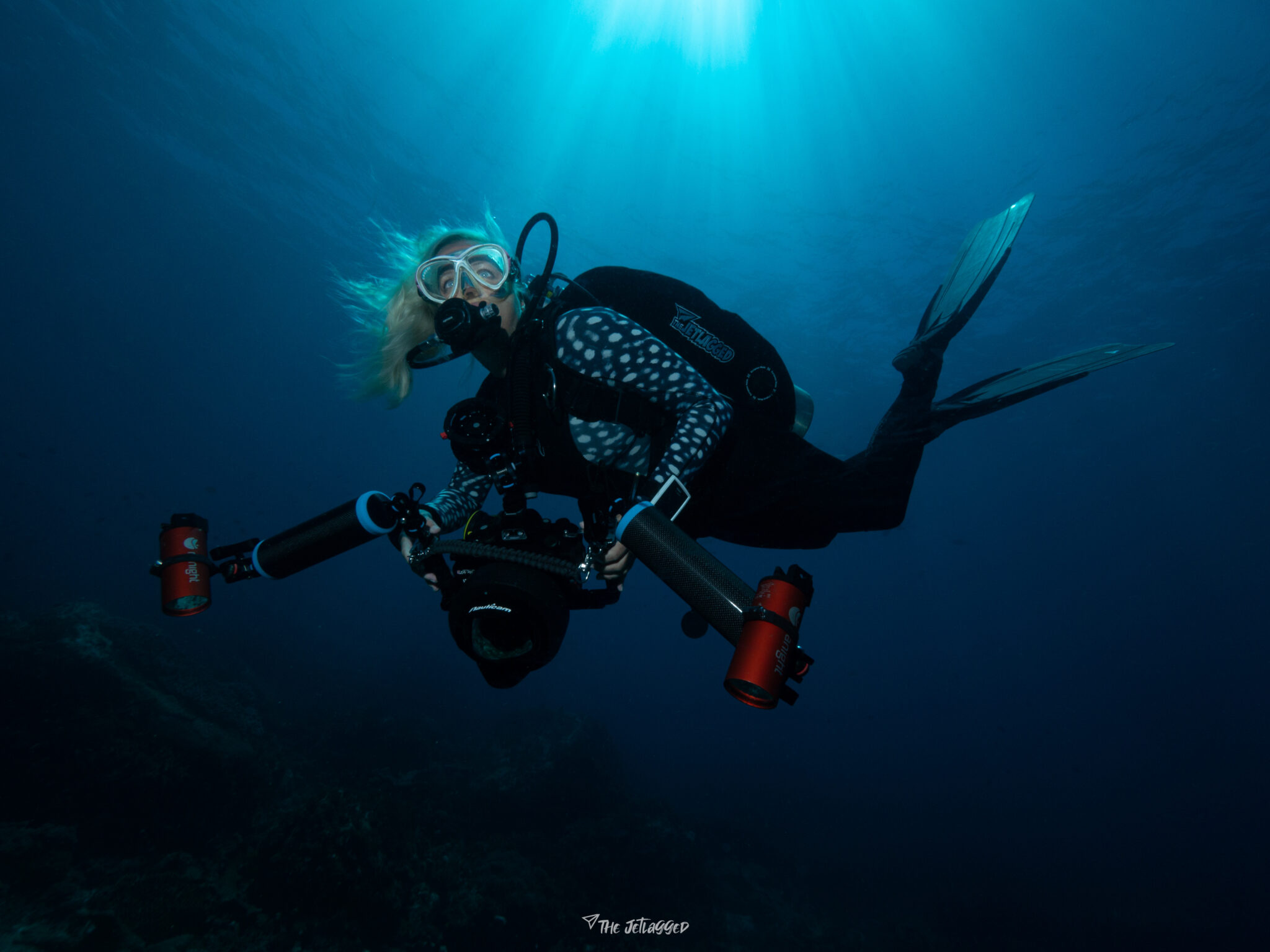 Claudia Schmitt from TheJetlagged uses her PADI Pro skills and her storytelling prowess to inspire others to save the ocean. Barney Seier
Claudia Schmitt from TheJetlagged uses her PADI Pro skills and her storytelling prowess to inspire others to save the ocean. Barney Seier
The Jetlagged team also uses virtual reality films to make their storytelling more impactful and far-reaching. 99.9% of the world’s population don’t dive or have access to the underwater world, she shared. “Virtual reality can change that by bringing unique ocean experiences to the viewers in a deeply emotional way – helping them to understand the importance of a healthy ocean for our own survival on this planet.”
Additionally, VR films are powerful storytelling tools that create a “truly immersive viewer experience in one of the most unreachable places of this Earth – the depths of the ocean,” Schmitt said. TheJetlagged uses VR and films to help land lovers anywhere and everywhere explore and experience the beauty of the deep.
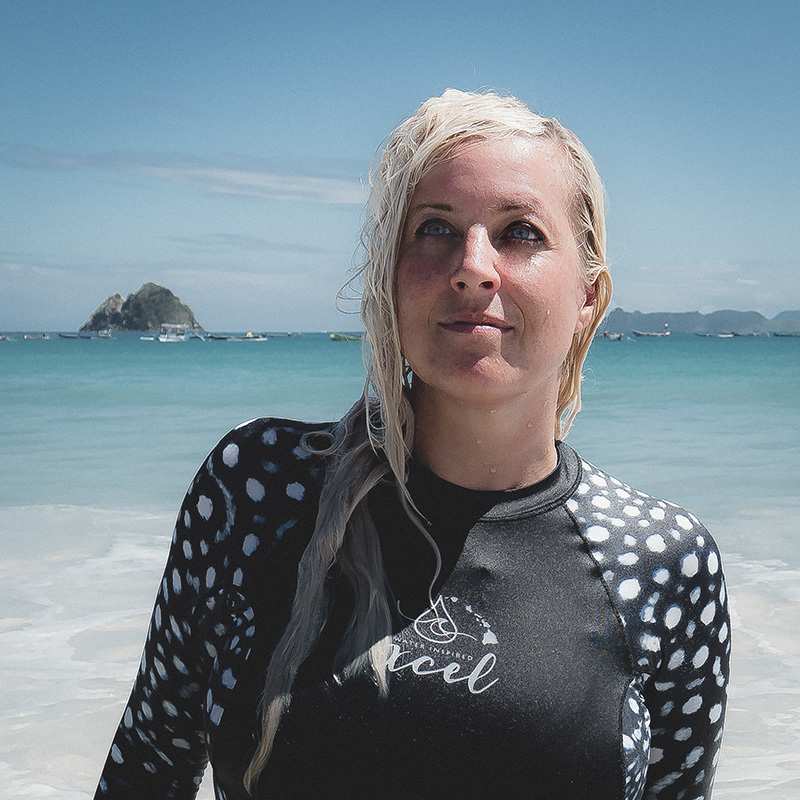 AmbassaDiver Claudia Schmitt from TheJetlagged.
AmbassaDiver Claudia Schmitt from TheJetlagged.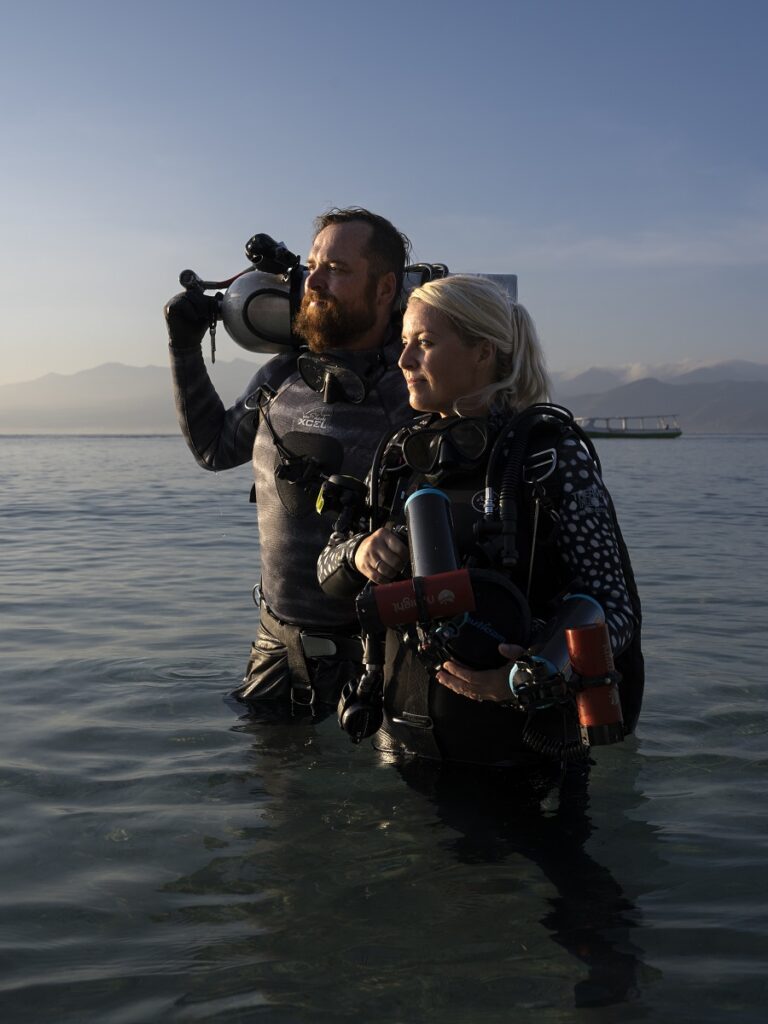 Henrik and Claudia Schmitt from TheJetlagged. Alex Kydd
Henrik and Claudia Schmitt from TheJetlagged. Alex KyddAs you can see, these badass PADI Pros are leading the way in making the dive industry more welcoming, equitable and accessible – for all. They’re the change we need and want to see, and they shared some final advice for any other females thinking of becoming a PADI Pro:
Trotman: “While the landscape is still predominantly male-dominated, both within the diving field and the broader marine conservation world, … remember, your presence and dedication have the power to challenge these norms and pave the way for greater inclusivity…. The key lies not only in shattering those barriers but in extending a hand to uplift and support those who will follow you.” St Clair: “Gender equity and ocean health are intrinsically linked. We know that women are disproportionately predisposed to suffer the impacts of climate and environmental disasters despite being cited as key agents of change for our oceans and studies prove time and time again their ability to nurture a culture of marine stewardship …. This is why equity of opportunity is so important – creating space for women to have a seat at the table in conserving the ocean.” Hashim: “You will not only gain confidence as a diver but interacting with the ocean and sharing the experience with others will bring you joy and fulfillment. Inspiring action to protect the ocean through diving is one way you could contribute to tackling some of today’s biggest challenges.” Veelenturf: “It’s exciting to be a woman in diving and to push boundaries and gender stereotypes. We can all work to make space for other women in this field who may not feel it is for them or may have been told from an early age that they can’t be as adventurous and wild as their male classmates.” Schmitt: “Just go for it, step by step. Bond with other women. We’re not competitors; we’re allies. Bond with men, too. They are our friends, not our enemies. We are one diving community and are all connected by our love for the ocean.”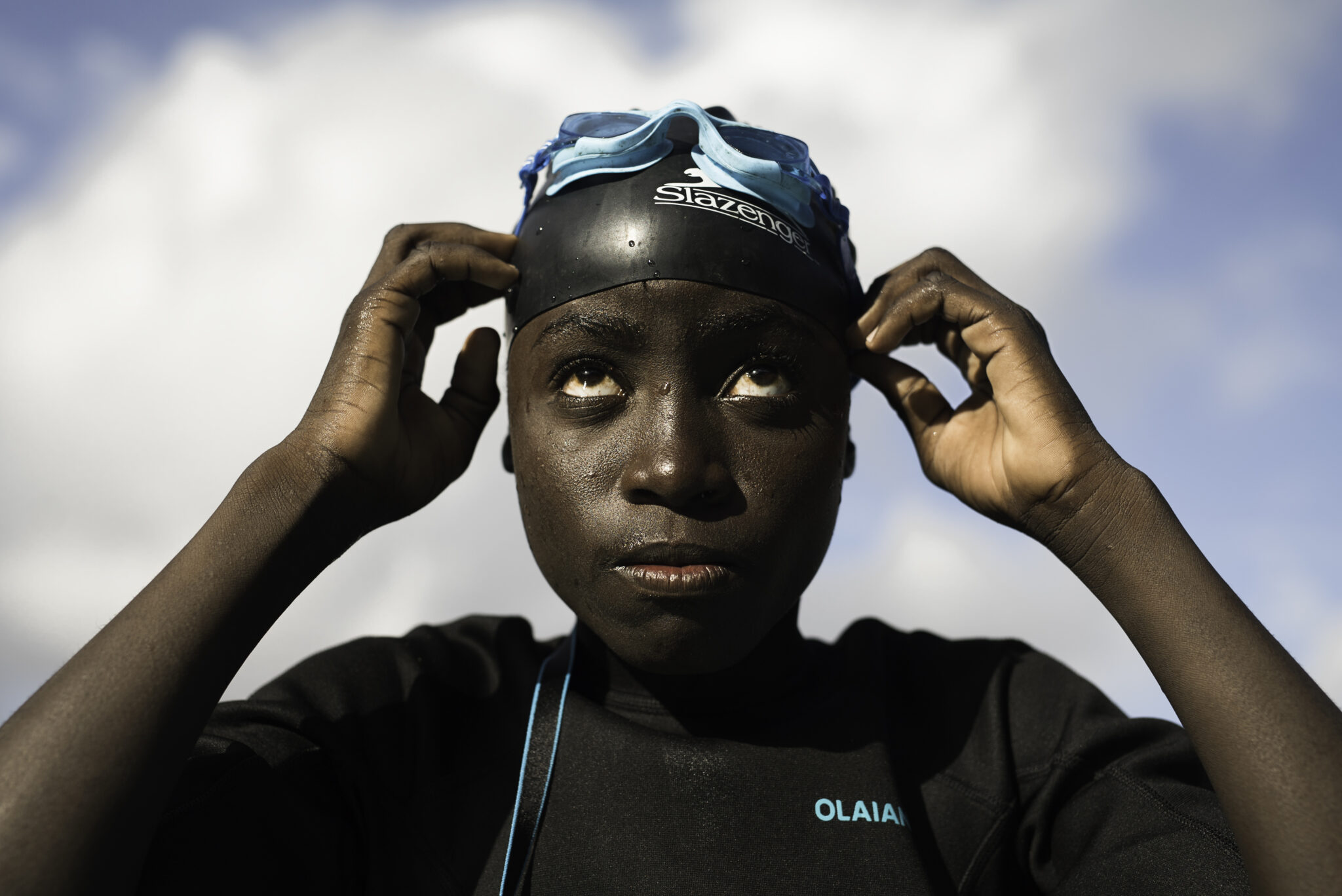 Love The Oceans knows that empowered people continue to help others and the planet. They teach locals how to swim and do important conservation work. Danielle Da Silva/Photographers Without Borders
Love The Oceans knows that empowered people continue to help others and the planet. They teach locals how to swim and do important conservation work. Danielle Da Silva/Photographers Without Borders
Share This